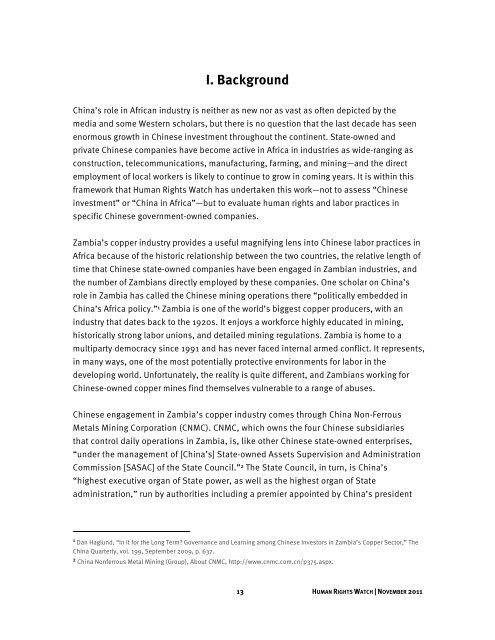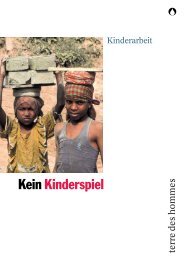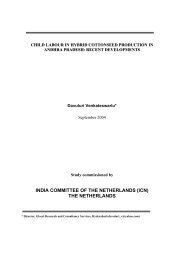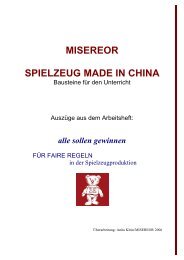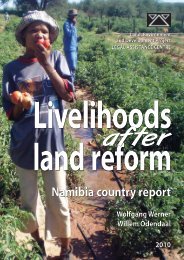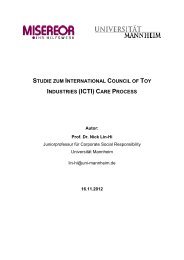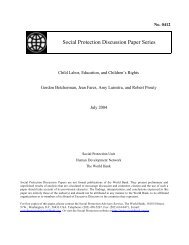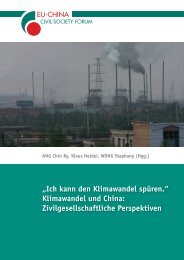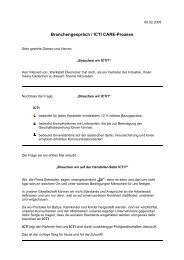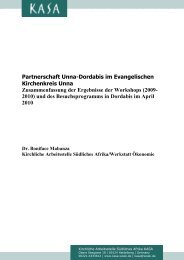“You'll Be Fired if You Refuse†- Human Rights Watch
“You'll Be Fired if You Refuse†- Human Rights Watch
“You'll Be Fired if You Refuse†- Human Rights Watch
You also want an ePaper? Increase the reach of your titles
YUMPU automatically turns print PDFs into web optimized ePapers that Google loves.
I. Background<br />
China’s role in African industry is neither as new nor as vast as often depicted by the<br />
media and some Western scholars, but there is no question that the last decade has seen<br />
enormous growth in Chinese investment throughout the continent. State-owned and<br />
private Chinese companies have become active in Africa in industries as wide-ranging as<br />
construction, telecommunications, manufacturing, farming, and mining—and the direct<br />
employment of local workers is likely to continue to grow in coming years. It is within this<br />
framework that <strong>Human</strong> <strong>Rights</strong> <strong>Watch</strong> has undertaken this work—not to assess “Chinese<br />
investment” or “China in Africa”—but to evaluate human rights and labor practices in<br />
spec<strong>if</strong>ic Chinese government-owned companies.<br />
Zambia’s copper industry provides a useful magn<strong>if</strong>ying lens into Chinese labor practices in<br />
Africa because of the historic relationship between the two countries, the relative length of<br />
time that Chinese state-owned companies have been engaged in Zambian industries, and<br />
the number of Zambians directly employed by these companies. One scholar on China’s<br />
role in Zambia has called the Chinese mining operations there “politically embedded in<br />
China’s Africa policy.” 1 Zambia is one of the world’s biggest copper producers, with an<br />
industry that dates back to the 1920s. It enjoys a workforce highly educated in mining,<br />
historically strong labor unions, and detailed mining regulations. Zambia is home to a<br />
multiparty democracy since 1991 and has never faced internal armed conflict. It represents,<br />
in many ways, one of the most potentially protective environments for labor in the<br />
developing world. Unfortunately, the reality is quite d<strong>if</strong>ferent, and Zambians working for<br />
Chinese-owned copper mines find themselves vulnerable to a range of abuses.<br />
Chinese engagement in Zambia’s copper industry comes through China Non-Ferrous<br />
Metals Mining Corporation (CNMC). CNMC, which owns the four Chinese subsidiaries<br />
that control daily operations in Zambia, is, like other Chinese state-owned enterprises,<br />
“under the management of [China’s] State-owned Assets Supervision and Administration<br />
Commission [SASAC] of the State Council.” 2 The State Council, in turn, is China’s<br />
“highest executive organ of State power, as well as the highest organ of State<br />
administration,” run by authorities including a premier appointed by China’s president<br />
1 Dan Haglund, “In It for the Long Term? Governance and Learning among Chinese Investors in Zambia’s Copper Sector,” The<br />
China Quarterly, vol. 199, September 2009, p. 637.<br />
2 China Nonferrous Metal Mining (Group), About CNMC, http://www.cnmc.com.cn/p375.aspx.<br />
13 HUMAN RIGHTS WATCH | NOVEMBER 2011


